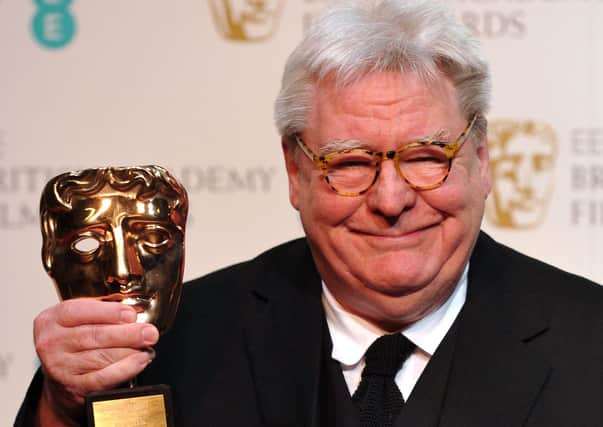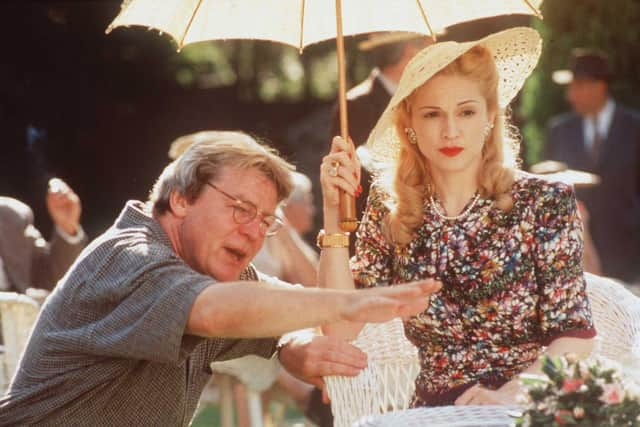Obituary: Alan Parker, film director of landmark movies including Bugsy Malone and Evita


Alan Parker was a working-class Londoner who directed the famous Cinzano Bianco commercials with Leonard Rossiter and Joan Collins and went on to become one of Britain’s most successful, versatile and controversial film-makers, directing such landmark movies as Bugsy Malone and The Commitments.
But he was one of Britain’s most successful directors only in so much as he was British, born and bred in London, for he was dismissive of the British film industry and headed for Hollywood at the first opportunity.
Advertisement
Hide AdAdvertisement
Hide AdParker was no great cinema visionary like David Lean. Nor did he use films to advance a political agenda, like Ken Loach, who was horrified when Parker accepted a knighthood in 2002. He was not noted for work in a single genre, like Hitchcock or Sergio Leone, and it was difficult to identify an Alan Parker movie or style as one would a Woody Allen film.


He came from a background in television commercials and he made mainstream commercial films that appealed to multiplex audiences. He enjoyed his greatest success with musicals that sometimes challenged genre convention or turned it upside down, never more so than when he cast children in every role in Bugsy Malone, his first feature film as a director. He also directed Fame, Pink Floyd – The Wall and the big-screen adaptation of Evita, with Madonna.
But his most memorable films also include the Gothic thriller Angel Heart, with Robert De Niro as the Devil, and the dramas Midnight Express and Mississippi Burning. Both were based on true stories, but Parker prompted controversy by playing fast and loose with the facts. And while Mississippi Burning was explicitly about racism in the American South, Midnight Express itself was accused of being racist.
Loosely based on the case of Billy Hayes, it is the story of an American who finds himself in a Turkish prison for smuggling cannabis. It is visually and narratively exciting, with Hayes as hero and the Turks as villains (as if drug smuggling was some basic freedom enshrined in the American constitution).
Film-makers have to streamline true-life stories, but Parker went way beyond the normal standards of compression and dramatisation, inventing several major scenes, including one in which Hayes (Brad Davis) bites out another prisoner’s tongue and another in which he kills a guard. But the film was an international hit, won two Oscars and four more nominations, including one for direction.
There were no airs and graces about Parker, no political correctness, virtue signalling or pretentiousness. Early in his career he was asked by journalists about his background and told them his father was an avant-garde artist who worked exclusively in grey. At the time, his father was painting railings for the local electricity board. The story is indicative of a mischievous sense of humour and a disdain for critics and what he saw as their elitism and snobbery.
He was born Alan William Parker in Islington, in London, in 1944. After leaving school, he worked as an advertising copywriter and then a director of commercials at Collett Dickenson Pearce, an agency that revolutionised British advertising with a mix of surrealism and humour. His Cinzano Bianco adverts lampooned the pretentiousness of rival brand Martini and were more popular than most programmes.
Erstwhile colleague David Puttnam suggested he think about writing film scripts. Parker was initially sceptical as he had never written anything longer than 30 seconds. But between them they came up with the 1971 schoolboy romance Melody. It marked the debut of Puttnam as a film producer and Parker as a film writer (although it was directed by Waris Hussein).
Advertisement
Hide AdAdvertisement
Hide AdIt did little at the box office and Parker continued to make commercials, wrote and directed short films and got his initial breakthrough as a drama director with The Evacuees, a 1975 BBC drama about two Jewish boys evacuated from London during the Blitz, written by Jack Rosenthal.
Bugsy Malone marked Parker’s debut as a feature film director, it involved Puttnam as producer, shot at Pinewood and was aimed at the American market. It was essentially a pastiche of Hollywood gangster movies, with a child cast, including Jodie Foster, and machine-guns replaced by splurge guns, which basically fired custard pies. The influential American critic John Simon branded it “an outrage”. “Wholesome youngsters have been duped into acting like adults,” he said, “stupid, brutal, criminal adults, at that.” It flopped in the US, though it was a hit in the UK and elsewhere.
Parker made his mark in the US with his next two films, Midnight Express and Fame, another musical. Fame had a spin-off TV series. He returned to the UK to make Pink Floyd The Wall and maintained a home in England, but he worked largely in the US or with American companies.
He went to Ireland in 1990 for The Commitments, a warm-hearted, foul-mouthed portrait of a ragbag bunch of musicians and singers who dream of stardom. Shot on a relatively modest budget, it was funny, it had great soul (in both senses of the word) and Parker picked up Bafta awards for best film and best direction, to add to those he won back in the 1970s for The Evacuees, Bugsy Malone (screenplay) and Midnight Express (direction). In 2005 The Commitments topped a poll to determine the greatest Irish film of all time.
By his early sixties Parker admitted he had lost his hunger for making films. His last film was The Life of David Gale 17 years ago. His first marriage ended in divorce and in 2001 he married Lisa Moran, who was his assistant on The Commitments, and he became a father again. He is survived by his wife and his five children.
Comments
Want to join the conversation? Please or to comment on this article.